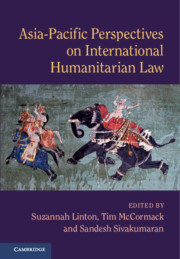Book contents
- Asia-Pacific Perspectives on International Humanitarian Law
- Asia-Pacific Perspectives on International Humanitarian Law
- Copyright page
- Contents
- Figures and Tables
- Contributors
- Foreword
- Foreword
- Acknowledgements
- Editors’ Note
- 1 Introduction: Asia-Pacific Perspectives on International Humanitarian Law
- Part I Interviews
- Part II Development of International Humanitarian Law
- Part III Practice and Application of International Humanitarian Law
- 13 Pacific Island States and International Humanitarian Law
- 14 Challenges of Hybrid Warfare to the Implementation of International Humanitarian Law in the Asia-Pacific
- 15 Counter-Terrorism Law and Armed Conflict in Asia
- 16 Detention in Non-International Armed Conflicts
- 17 The Chemical Weapons Convention in the Asia-Pacific Region
- 18 Wartime Military Sexual Enslavement in the Asia-Pacific
- 19 Protection of Education in Armed Conflict Situations: Asia-Pacific in Focus
- 20 Cyberspace and International Humanitarian Law: The Chinese Approach
- 21 Ethnic Conflicts in Myanmar: The Application of the Law of Non-International Armed Conflict
- 22 The Korean War (1950–1953) and the Treatment of Prisoners of War
- 23 Jihad and International Humanitarian Law: Three Moro Rebel Groups in the Philippines
- 24 International Humanitarian Law in Occupied East Timor: Displacement, Relocation and Famine
- 25 Reinterpreting the Law to Justify the Facts: An Analysis of International Humanitarian Law Interpretation in Sri Lanka
- 26 Japan and Nuclear Weapons
- 27 The Post-War History of Japan: Renouncing War and Adopting International Humanitarian Law
- Part IV Implementation and Enforcement of International Humanitarian Law
- Part V Looking to the Future and Enhancing Compliance with International Humanitarian Law
- Glossary of Publications
- Alphabetical Glossary of Cases and Decisions
- Chronological Glossary of Cases and Decisions
- Treaties and Other International Instruments, Resolutions and National Documents with an International Dimension
- Chronological Glossary of National Legislation and Secondary Instruments
- Peace Agreements and Communiques
- Abbreviations and Translations
- Index
22 - The Korean War (1950–1953) and the Treatment of Prisoners of War
from Part III - Practice and Application of International Humanitarian Law
Published online by Cambridge University Press: 18 October 2019
- Asia-Pacific Perspectives on International Humanitarian Law
- Asia-Pacific Perspectives on International Humanitarian Law
- Copyright page
- Contents
- Figures and Tables
- Contributors
- Foreword
- Foreword
- Acknowledgements
- Editors’ Note
- 1 Introduction: Asia-Pacific Perspectives on International Humanitarian Law
- Part I Interviews
- Part II Development of International Humanitarian Law
- Part III Practice and Application of International Humanitarian Law
- 13 Pacific Island States and International Humanitarian Law
- 14 Challenges of Hybrid Warfare to the Implementation of International Humanitarian Law in the Asia-Pacific
- 15 Counter-Terrorism Law and Armed Conflict in Asia
- 16 Detention in Non-International Armed Conflicts
- 17 The Chemical Weapons Convention in the Asia-Pacific Region
- 18 Wartime Military Sexual Enslavement in the Asia-Pacific
- 19 Protection of Education in Armed Conflict Situations: Asia-Pacific in Focus
- 20 Cyberspace and International Humanitarian Law: The Chinese Approach
- 21 Ethnic Conflicts in Myanmar: The Application of the Law of Non-International Armed Conflict
- 22 The Korean War (1950–1953) and the Treatment of Prisoners of War
- 23 Jihad and International Humanitarian Law: Three Moro Rebel Groups in the Philippines
- 24 International Humanitarian Law in Occupied East Timor: Displacement, Relocation and Famine
- 25 Reinterpreting the Law to Justify the Facts: An Analysis of International Humanitarian Law Interpretation in Sri Lanka
- 26 Japan and Nuclear Weapons
- 27 The Post-War History of Japan: Renouncing War and Adopting International Humanitarian Law
- Part IV Implementation and Enforcement of International Humanitarian Law
- Part V Looking to the Future and Enhancing Compliance with International Humanitarian Law
- Glossary of Publications
- Alphabetical Glossary of Cases and Decisions
- Chronological Glossary of Cases and Decisions
- Treaties and Other International Instruments, Resolutions and National Documents with an International Dimension
- Chronological Glossary of National Legislation and Secondary Instruments
- Peace Agreements and Communiques
- Abbreviations and Translations
- Index
Summary
One of the most important principles in international humanitarian law (IHL) is distinction. The principle states that civilians and combatants are not to be treated the same way. Civilians are not legitimate military targets. They are not supposed to be taking part in hostilities. If such a civilian participates in hostilities during armed conflict, he or she may lose his (or her) privilege as a civilian and become a legitimate military target for such time as they do. On the other hand, combatants are legitimate targets for 24 hours a day and 365 days a year. However, assuming the combatant operates within IHL, he (or she) will be immune from legal responsibility concerning results which his (or her) violent act brings about during armed conflict. This is the ‘combatant immunity’ or ‘combatant privilege’. To take it further, even though combatants may be captured by the adversary, they may not be punished because of hostile acts which are nevertheless lawful. In an international armed conflict (IAC), such persons enjoy prisoner of war (POW) status at that moment. But if the combatant intentionally kills or tortures civilians or POWs, then he or she would be committing war crimes (grave breach), and that must be prosecuted. It does not mean the POW status is lost.
- Type
- Chapter
- Information
- Asia-Pacific Perspectives on International Humanitarian Law , pp. 356 - 373Publisher: Cambridge University PressPrint publication year: 2019



